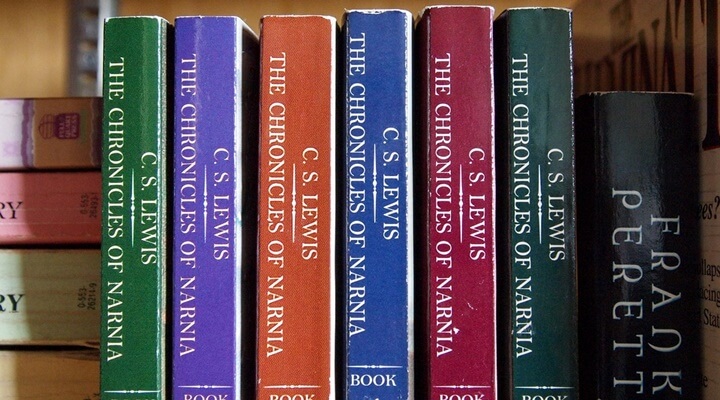For many the best pieces of prose are the words that are written in the current book they are reading. And yet there are pieces of prose that remain with us long after the final page has been turned. Here we look at some of our best pieces of prose

C S Lewis: The Discarded Image
Not many writers can make the reader wish to be a medieval Christian.
Whatever else a modern feels when he looks at the night sky, he certainly feels that he is looking OUT- like one looking out from the saloon entrance onto the dark Atlantic or from the ligted porch upon dark and lonely moors. But if you accepted the medieval model you would feel like one looking IN. The Earth is ‘outside the city wall’. When the sun is up he dazzles us and we cannot see inside. Darkness, our own darkness, draws the veil and we catch a glimpse of the high pomps within; the vast, lighted concavity filled with music and life.
Evelyn Waugh: Officers and Gentlemen
Evelyn Waugh’s prose is often beautiful, simple, yet perfect. At this point we are in Crete during the allied retreat in WW2:
Suddenly quite near him there was a rifle shot. He heard the crack and smack and whistling ricochet among the rocks behind him. He dropped his torch and began feebly to trot. He lost the path and stumbled from boulder to boulder until treading on something which seemed smooth and round and solid in the star light he found himself in the top of a tree which grew twenty feet below. Scattering Greek currency among the leaves, he subsided quite gently from branch to branch and when he reached ground continued to roll over and over, down and down, caressed and momentarily stayed by bushes until at length he came to rest as though borne there by a benevolent Zephyr of classical myth, in a soft, dark, sweet-smelling, empty place where the only sound was the music of falling water. And there for a time the descent ended. Out of sight, out of hearing, the crowded boats put out from the beach; the men-o’ war sailed away and Fido slept.
George Orwell: Homage to Catalonia
Orwell, describing what it was like to be hit by a bullet in the Spanish Civil War:
…it was the sensation of being at the centre of an explosion. There seemed to be a loud bang and a blinding flash of light all round me, and I felt a tremendous shock- no pain, only violent shock, such as you get from an electric terminal; with it a sense of utter weakness, a feeling of being stricken and shrivelled up to nothing. The sand bags in front of me receded into immense distance.”
T E Lawrence: Seven Pillars of Wisdom
Recounting his rape and torture at the hands of Turkish soldiers in WW1:
To keep my mind in control I numbered the blows, but after twenty lost count and could feel only the shapeless weight of pain, not tearing claws, for which I had prepared, but a gradual cracking apart of my whole being by some too-great force whose waves rolled up my spine till they were pent within my brain, to clash terribly together. Somewhere in the place a cheap clock ticked loudly, and it distressed me that their beating was not in time. I writhed and twisted, but was held so tightly that my struggles were useless…As the punishment proceeded the whip fell more and more upon existing weals, biting blacker or more wet, till my flesh quivered with accumulated pain, and with terror of the next blow coming. They soon conquered my determination not to cry, but while my will ruled my lips I used only Arabic, and before the end a merciful sickness choked my utterance.”
Aldous Huxley: Those Barren Leaves
This is one of his characters, an upper class Englishman, speaking about Etruscan tombs in Italy:
Two thousand five hundred years ago they wept here over the newly dead. You see them hunting, drinking, making love. What else could you expect them to do? Translations will tell us nothing new.
Mary Wollstonecraft: A Short Residence in Sweden, Norway and Denmark
A fantastic extract from Mary Wollstonecraft’s semi-autobiographical A Short Residence in Sweden, Norway and Denmark. Here, she is describing her difficult emotions upon seeing a waterfall. The words seem to break down, but the meaning becomes so much clearer. A transcendant piece of emotion:
The impetuous dashing of the rebounding torrent from the dark cavities which mocked the exploring eye, produced an equal activity in my mind: my thoughts darted from earth to heaven, and I asked myself why I was chained to life and its misery? Still the tumultuous emotions this sublime object excited, were pleasurable; and, viewing it, my soul rose, with renewed dignity, above its cares – grasping at immortality – it seemed as impossible to stop the current of my thoughts, as of the always varying, still the same, torrent before me – I stretched out my hand to eternity, bounding over the dark speck of life to come.
Friedrich Nietzsche: The Joyful Wisdom
We, the generous and rich in spirit, who stand at the sides of the streets like open fountains and would hinder no one from drinking from us, we do not know, alas! how to defend ourseles when we should like to do so; we have no means of preventing ourselves being made turbid and dark – we have no means of preventing the age in which we live casting its “up-to-date rubbish” into us, nor of hindering filthy birds throwing their excrement, the boys their trash, and fatigued resting travelers their misery, great and small, into us. But we do as we have always done; we take whatever is cast into us down into our depths – for we are deep, we do not forget – and once more grow clear.
